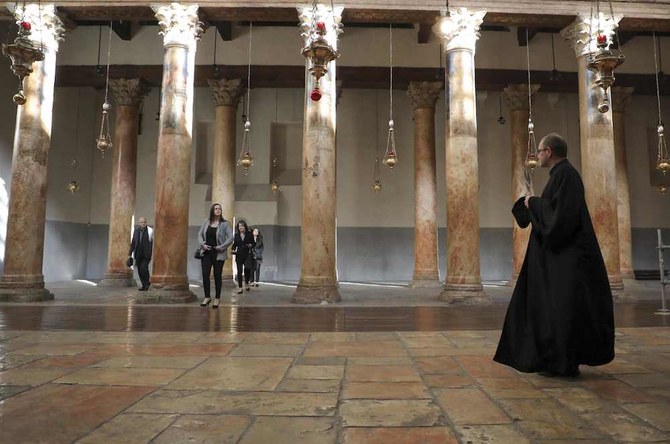JERUSALEM: Christians in the Gaza Strip will be allowed to visit holy cities such as Bethlehem and Jerusalem at Christmas, Israel authorities said on Sunday, reversing a decision not to issue them permits.
Israel tightly restricts movements out of the Gaza Strip, territory controlled by Hamas that it considers a terrorist organization.
In a break from its usual Christmas holiday policy, Israel’s military liaison to the Palestinians said on Dec. 12 that in accordance with “security orders” Gaza Christians would be allowed to travel abroad but none would be permitted to go Israel or the occupied West Bank.
On Sunday, the liaison office, known as COGAT, announced on Twitter that its director has “extended the travel facilitations for the Christian population of Gaza for the Christmas holiday.”
As a result, COGAT said, “entry permits for Jerusalem and for the West Bank will be issued in accordance with security assessments and without regard to age.”
Gaza has only around 1,000 Christians, most of them Greek Orthodox, in a population of 2 million in the narrow coastal strip.
Last year, Israel granted permits for close to 700 Gaza Christians to travel to Jerusalem, Bethlehem, Nazareth and other holy cities that draw thousands of pilgrims each holiday season.
Christian leaders in Jerusalem had condemned the initial entry ban and said they would appeal to Israeli authorities to lift it.
Meanwhile, less than an hour after a group of Indian tourists arrive at Bethlehem’s Church of the Nativity, they exit smiling, directly board their bus and head back to Jerusalem.
The city where Christians believe Jesus was born is teeming with tourists — but the Christmas spirit is dampened by complaints that Israeli tour operators don’t allow the city to truly benefit from the influx.
While Bethlehem’s 50-odd hotels are fully booked during the peak season around Christmas Day, December 25, they struggle to ensure occupancy rates throughout the year.
Less than a third of the three million tourists who visit Bethlehem every year spend at least one night there, according to the Palestinian Hotel Association.
Most head straight back through the Israeli checkpoint and out of the occupied West Bank.
Palestinians accuse Israeli tour companies of seeking to undermine their business by organizing only fleeting visits.
In the search for more regular business, the small city, located between Jerusalem and Hebron in the southern West Bank, is looking to expand non-religious tourism.
Ironically, a major draw now is the history of the Israeli-Palestinian conflict itself, and the political street art it has spawned.
Especially the works of Banksy, the British spray-can maestro whose true identity remains a secret, have drawn many visitors and spawned a graffiti-themed tourism cottage industry.
In the square in front of the church that remains the main draw in Bethlehem, a Brazilian couple and their daughter were delighted to have visited the site as part of a three-week tour including Jerusalem and other cities.
“It was very fast, but it was enough,” said the mother before heading back to Jerusalem where they would stay the night.
A nearby trader lamented the fact tourists don’t bother to explore the city’s streets and markets.
“It is not that far away, they just have to cross the square,” he said.
Samir Hazboun, head of the Bethlehem chamber of commerce, said the city was trying to diversify its offerings.
Tourists “can visit many other cultural and historical places,” he said, pointing to the site of one of King Herod’s former palaces and the UNESCO-listed village of Battir.
Hazboun said many tourists did not stay longer because they visit with Israel-based travel agents that “control” the length of visits in the West Bank, a Palestinian territory occupied by Israel since 1967.
Elias Al-Arja, president of the Palestinian Hotel Association, pointed out that while the number of hotels had increased fivefold in 20 years, infrastructure, in particular for water and power, still lags behind.
Beyond those looking for religion, Bethlehem is increasingly drawing tourists attracted to the street art.
Many come to admire the graffiti and stencil pictures on the separation barrier Israel began erecting in 2002 during the second Palestinian intifada, or uprising.
Israel says the barrier, which near Bethlehem is a five-meter (16 foot) concrete wall, is needed to protect itself, while Palestinians label it an apartheid wall.
When AFP visited, a young European was rolling white paint onto the wall, giving him a clean surface to graffiti.
A few steps away, a shop sold spray cans and stencils for tourists wanting to leave a trace of their passage.
The store is owned by the adjoining “Walled-Off Hotel” which was opened in 2017 by Banksy.
All rooms in the hotel overlook the wall and are decorated with works about the Israeli-Palestinian conflict, which is also the theme of a ground floor museum.
Wissam Salsaa, the hotel’s manager, said many guests had never dreamed of visiting Bethlehem or the West Bank until the hotel was established.
“Banksy has contributed a lot to non-classical tourism in Bethlehem,” he said, estimating that 250,000 people had visited the hotel in the two years since it opened.
These mostly young tourists normally come in small groups, not competing with the buses of often older tourists visiting the church. Some don’t even visit the religious sites.
Yet even these tourists often don’t stay.
Simon and Jan, two young Germans seated on the hotel’s terrace, said the museum was “very interesting” and allowed the uninitiated to familiarise themselves with the conflict.
They said they were only stopping by, though, and would spend the night in Tel Aviv.
(With AFP and Reuters)
























